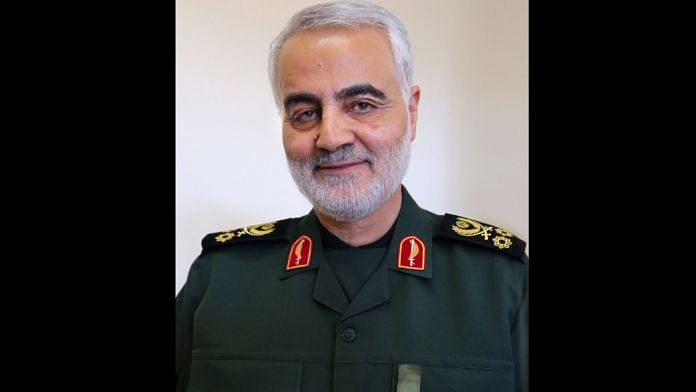The law of unintended consequences is the only real law of history.” So says my good friend, the distinguished historian Niall Ferguson. We are seeing the wisdom of that line playing out in the days since a U.S. drone strike killed Iran’s most important military commander, Qassem Soleimani.
Certainly Soleimani was a dangerous, smart, determined enemy of the U.S. Taking his skills away from the Iranian regime is a tactical plus in the effort against Iranian aggression and Middle East terrorism. Indeed, Iran’s ability to respond to Soleimani’s killing is now handicapped — the best person to imagine, plan and oversee a revenge operation would have been Soleimani himself.
But this tactical success is not matched by an articulated strategic approach from the administration of President Donald Trump. Think of chess, a game the Persians refined: Trump has taken one of the opponent’s most powerful pieces off the board. Good. Yet there’s no reason to think he has a plan to ultimately defeat a clever opponent who still has many capable moves available.
And perhaps most concerningly, there are an increasing number of unintended consequences beginning to emerge — several of which could have a disproportionate impact on global events. So often, big doors can swing on small hinges. The effects of Soleimani’s death will ripple from Baghdad to Tel Aviv to Nairobi to South America.
Let’s start with Venezuela. Over the past couple of days, there has been an apparent inflection point as the corrupt regime of Nicolas Maduro has attempted to unseat the legally elected leader of the National Assembly, Juan Guaido. Maduro has used the typical heavy-handed techniques, including physically blocking Guaido and other anti-regime elected officials from the assembly, while supporting a regime puppet to lead it. Why is Maduro suddenly emboldened? In part, no doubt, because he knows the U.S. administration is focused on Iran, not watching events in Latin America closely. Unintended consequence.
How about East Africa? On Sunday morning, three Americans were killed in Kenya, the latest of a string of attacks against U.S. interests by the terrorist group al-Shabab. Members of the group, which is associated with al-Qaeda, stormed an air base shared by U.S. troops and Kenyan forces and damaged American aircraft in addition to killing one U.S. service member and two civilian contractors. Al-Shabab watches CNN like every other terrorist group, and is well aware that the “unblinking eye” of U.S. intelligence collection has of necessity shifted its gaze to Iran. Unintended consequence.
Also read: Iran’s Qassem Soleimani was on Bush and Obama’s kill list too but Trump went for the attack
Then there is Israel, which faces an enormous threat from Iran’s Lebanese proxy force, Hezbollah, which has tens of thousands of surface-to-surface missiles directed against America’s closest friend in the region. While most Israelis are happy to see Soleimani dead, there is understandable concern about whether Iran will energize the Hezbollah missile force against Israel. The Israelis have many tools at their disposal to degrade that threat, but a massive rocket attack on Israel would change the strategic calculus of the Middle East significantly. Unintended consequence.
New drama unfolding in the Iraqi parliament will probably lead to the departure of the last 5,000 American troops from that very divided nation. At one time, of course, the U.S. had more than 180,000 troops in Iraq. The final tranche of military ground power is there primarily to destroy the Islamic State, but its secondary purpose is to be helpful in countering the strong Iranian influence in Iraq. One of the principal goals of Iran — and of Soleimani himself — was to ensure that the U.S. left the region generally, and especially that it depart Iraq. It will be ironic in the extreme if Soleimani’s death ends up ensuring his key goal: the U.S. finally exiting Iraq after so many years and so much blood and treasure lost, squandering its ability to shape events across the Middle East. Unintended consequence.
On Iraq’s western border, important operations against the Islamic State have been “paused.” Why? Because U.S. forces are taking defensive measures to keep people and assets safe against the inevitable Iranian response. This is prudent on the part of the Defense Department, of course, but it gives the terrorists a breather. And make no mistake, the embers of ISIS are still quite capable of flaring back up in both Iraq and Syria. Unintended consequence.
Finally, at the geostrategic level, there is the way the Soleimani assassination will be received in NATO. During my time as the alliance’s top military commander, it became clear to me that the center of gravity of the alliance is political cohesion. Now that consensus is weakening, as many of the member-states start questioning the legality of this action under international law. Germany has already suspended the rotation of its troops to Iraq, and the entire North Atlantic Treaty Organization mission there — to train the Iraqi security forces — is paused and at risk. Unintended consequence.
The lesson is simple: Before the U.S. makes a tactical decision to conduct an operation, administration officials and military planners need to think through the larger strategy of the chess match, which will continue long after a feel-good moment of killing one bad man. Based on what information has been made public and my own experience, I support the administration’s decision to take out Soleimani. But the consequences, especially the unintended ones, are going to set back U.S. efforts in the Middle East and around the world. You can’t escape the law of history. – Bloomberg
Also read: Why the US drone with Hellfire missiles left Iran’s Soleimani with no chance



